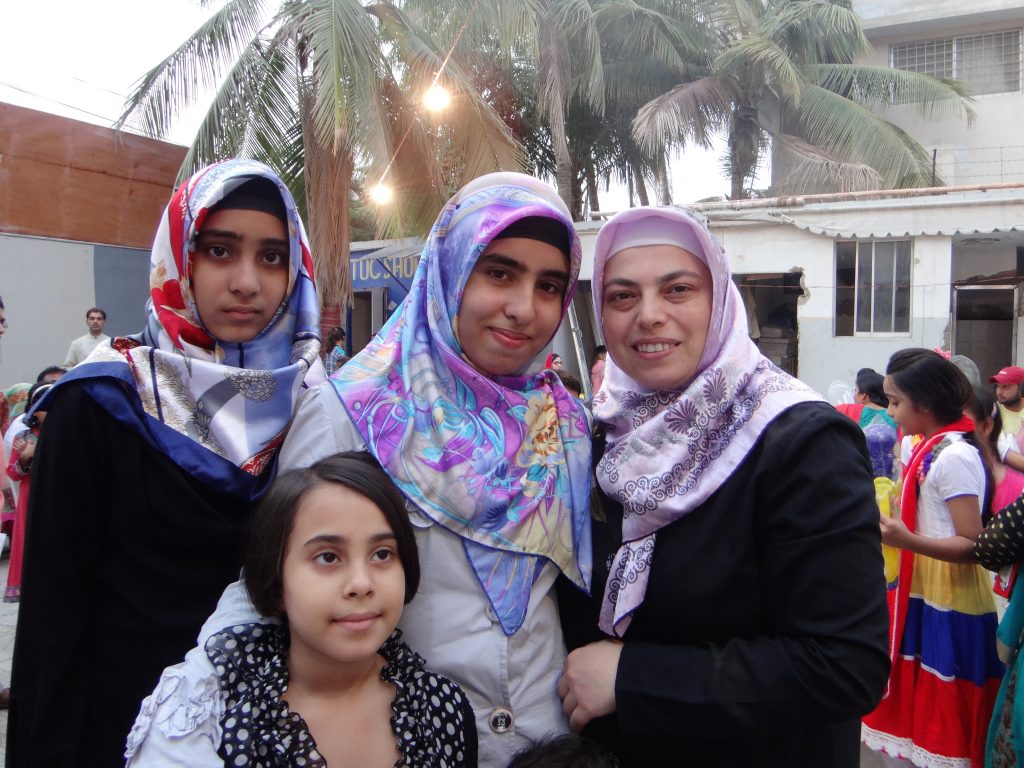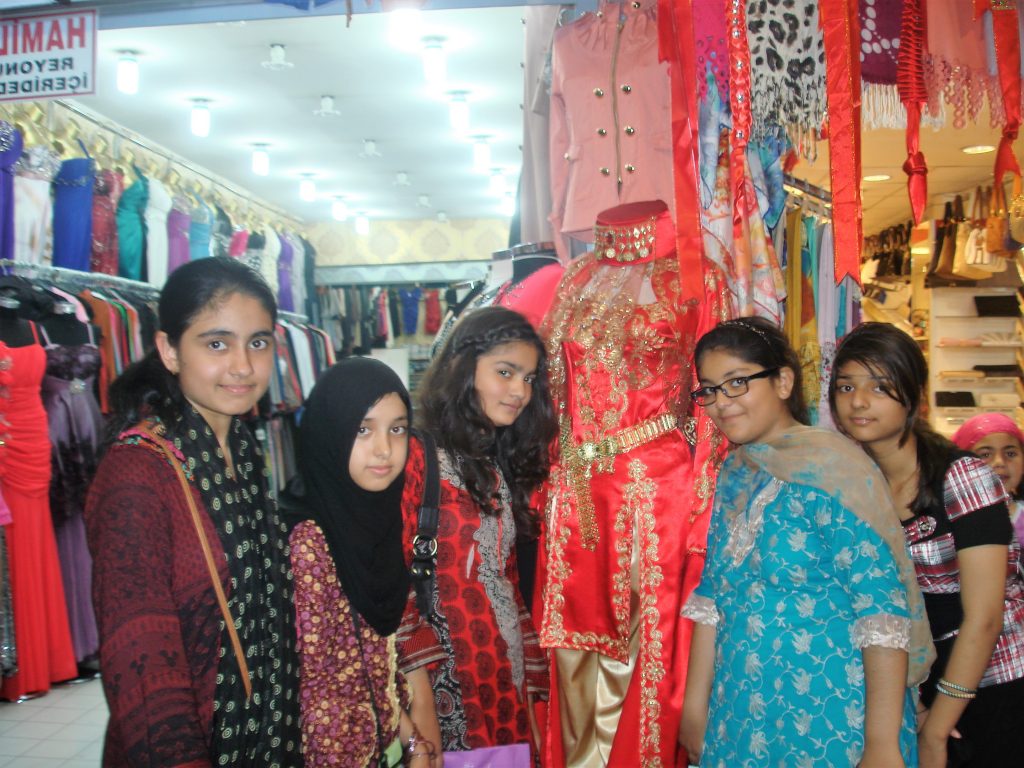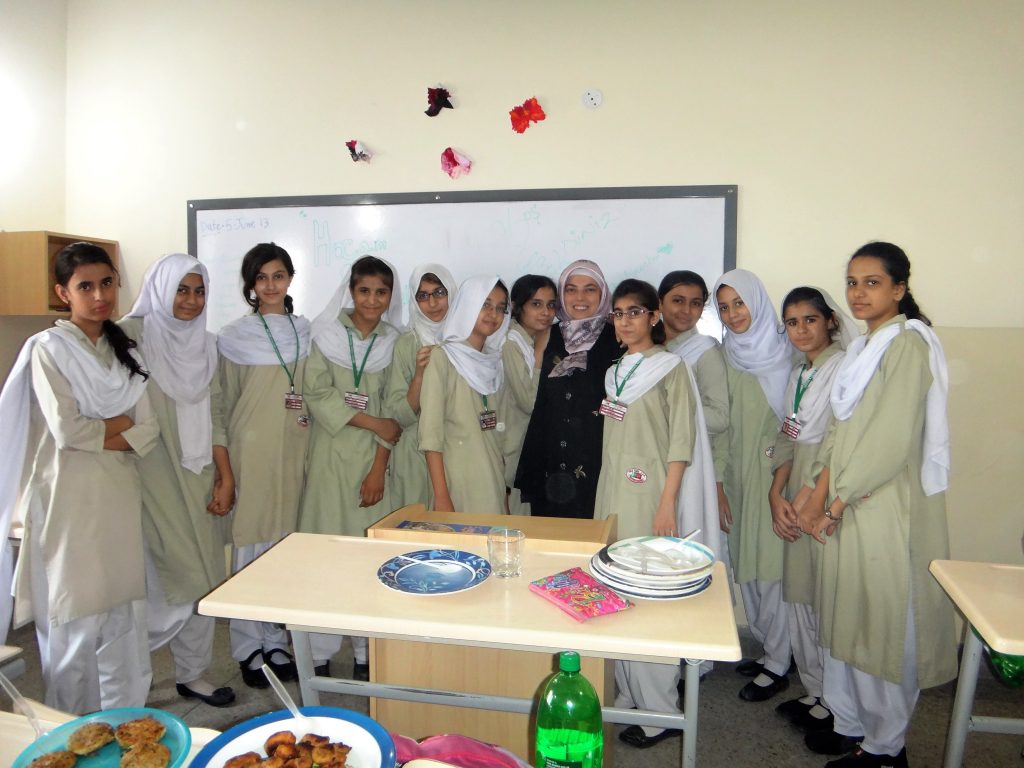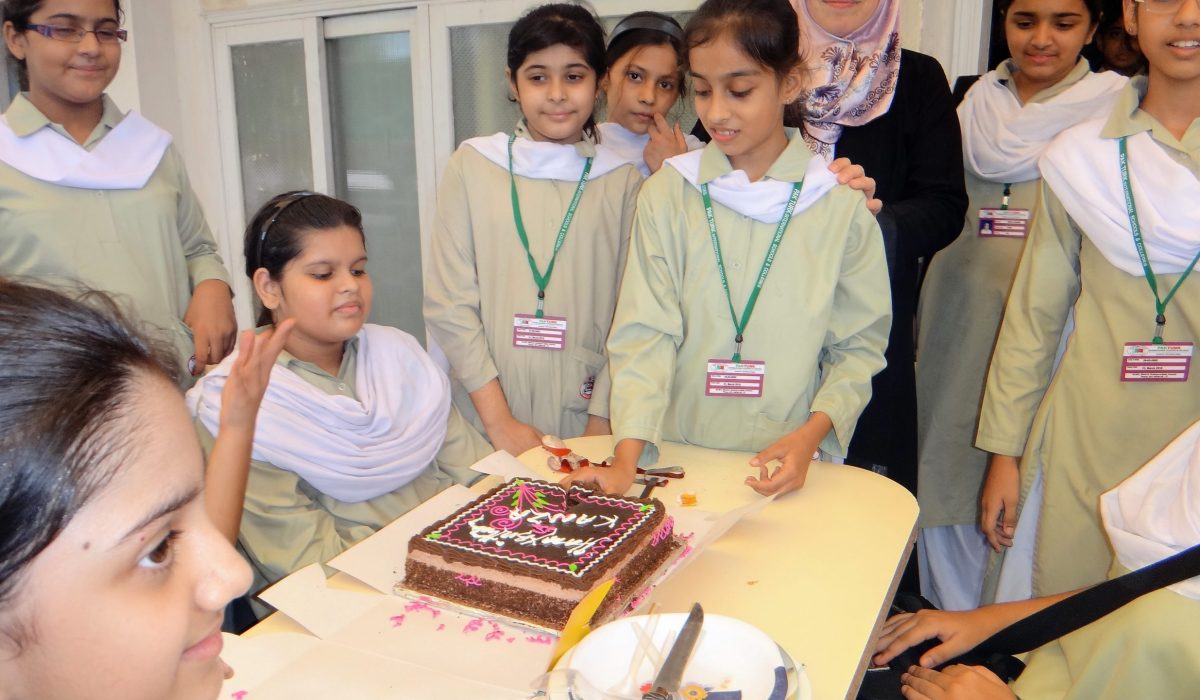Turkish teacher Elif Demirbaş: I was amazed by Pakistan’s arts, music, and colourful cultural mosaic

Solitude (Poem)
August 19, 2021
The ‘public relations department’ and the ‘businessmen association’ founded by teachers in Lahore
August 21, 2021Even if you went abroad with the idealistic intention of teaching, you know that life is not just about education and students. Living in a different country also means acclimatizing with its language, culture, food, water and weather. You live in the same neighbourhoods with your students, dine at the same table, and shop at the same markets.
The teachers of PakTurk Schools were like that; they never distanced themselves from the people of Pakistan. Elif Demirbaş, who taught Turkish in Karachi for four years, tells us about her life in Pakistan remembering her brilliant students and with bittersweet memories like the fear she felt to her life in the streets of Karachi and the colourful markets and the tables set with delicious dishes…
–Can you tell us a little about your life before you went to Pakistan?
I was born in Giresun. I graduated from Istanbul University, Department of History in 2001. I first went to Tanzania to teach abroad. I taught history there for about 8 years. My course covered topics like the history of Africa, the history of the 136 tribes there, their migration from south to north, and the leaders who left their mark on the history of Africa. Later, I prepared students for the Turkish Olympiads. I taught Turkish to 3rd to 8th grades in primary school.
I was already married when I first went to Tanzania. There were only three families there when I arrived there. Later, they left and we remained as the only family for a while until new families arrived. It was the first time our educational institutions were opened in Tanzania. The schools were in bungalows. There was no internet, electricity, and no water but it was very hot. I didn’t know a foreign language either. Nowadays, friends say “Tanzania is like Paris!” The facilities have improved, that is.
–When and how did the Pakistan years in your life begin?
In 2010, I went to Karachi, Pakistan, with my husband and two daughters. I lived in the same city for about 4 years. I taught Turkish there again, from the 6th to the 10th grade. Meanwhile, I also taught social ethics, a course on the practice of moral knowledge. I taught about universal moral values, such as honesty and benevolence. My daughters are African, but my son Sami Yusuf is Pakistani. He was born in Turkey, but grew up in Pakistan. My eldest daughter Nilüfer had finished the first grade of primary school on when we were to leave for Pakistan. She started her 2nd grade in Karachi. My youngest daughter started kindergarten there too. They had no adaptation problems. They were used to it already from Tanzania. They spoke English, the medium of instruction in Pakistan was English too.
–You had your first migration and overseas experience in Africa. What were your first impressions of Pakistan?
Frankly, I knew nothing about Pakistan. I only knew the beauty of Indian fabrics. I used to say, ‘I’ll probably find some nice fabrics there.’ I thought there would be long haired girls, Indian music, and colourful stuff. I loved Tanzania much. When I came to Pakistan from there, I was frankly disappointed at first. I remember crying for the first 6 months, because of having left Tanzania. Tanzania had natural beauties; I could watch the sparkly clean ocean. It was a lush green country with banana groves and coconut trees. There was always a sense of relief. When I came to Pakistan and Karachi, I encountered many buildings and a humid climate… It was very hot in Tanzania, but we could still find relief. Because of the theft and extortion incidents suffered by some people in Karachi friends often warned me, ‘Don’t go out alone, it’s dangerous!’ In the mornings, everywhere used to be open and when everyone was at work, everything could suddenly be shuttered as well. Street conflicts could arise due to political differences. We sometimes could not reach home for hours because the roads were blocked. We experienced such things.
PAKTURK HAD A HIGH QUALITY AND DEEP-SEATED SYSTEM OF EDUCATION
It was stifling in our first house. We were almost suffocated by the heat. I went out to search for a rental house on my own. Since it was a Muslim country, I also wore a headscarf, and I sensed that men found it strange that I went out alone seeking a residence. In the places where I asked for a rental house, they rarely gave me detailed answers. I used to see a house was empty, and when I asked, ‘Is it for rent?’, they would not answer. Again, while looking for a house like this, I told the guards sitting in front of a house that I was looking for a house to rent. They pointed to a house nearby. There, too, an old man was watering the lawn. The lawn was exquisitely trimmed. I also asked that old man, and he never spoke but gestured for me to go inside. I knocked at the door and a woman and a young girl came out. I spoke to them in English. “Is this house for rent?” I asked. They said, ‘No, this is our own house.’ I was so overwhelmed by the heat. I had my 3-year-old little daughter in the stroller, so they invited me in. It was a palace-like house with beautiful marble floor tiles and luxurious furniture. Turned out it was the house of the old man where he lived with his wife and extended family including his daughters, sons and daughters-in-law. The guards at the gate made fun of me because they realized that I was a foreigner. It must have seemed strange to them I was looking for a house all by myself.
–What was it like teaching in Pakistan after Tanzania?
The education system at the school was well established. It was far ahead of the ones in Tanzania. The school buildings were beautiful. I went to Peshawar for a seminar. 52 teachers came from different cities. The school building there was as beautiful as the ones in Turkey. Experienced teachers of Turkish taught us good teaching techniques. It was very good in that respect. Education and schools were at a very good level. The quality of the students was very good, the students were smart. They spoke Turkish well.

Our local teacher friends left me the impression they were more experienced than us. Even though I was a teacher for years, I used to attend the classes of my Pakistani colleagues and I was amazed by their teaching, they were very good. They were very active, skilful, swift, managing the class and the lesson from the moment they stepped into the classroom.
–How was your rapport with students and their parents? Did you see the effects of your joint activities?
Since I was proficient in English, I had no communication problems with the parents and the students. Our parent visits would go well. It was as if we had visited the homes of Turkish families. They were hospitable people; they were also very welcoming and caring. Yet, it was hard to get used to in terms of environment. We used to live in Gulshan-e-Iqbal district in Karachi. It was a district where mostly civil servants and the middle-class lived. There was also an elite district called Defence Housing Authority, or DHA for short. There was a lodge where we used to give cooking lessons. Among the participants were wealthy people from that neighbourhood. When they were leaving in the evening, they would ask, ‘Where are you going?’, and they would be surprised when we replied, ‘We are going to Gulshan-e-Iqbal’. They would say, ‘How are you going to get there at this hour?’. While the residents of the city were hesitant to go to Gulshan-e-Iqbal, we would drive in our car with children and friends.
YEARS PASSED BUT MY STUDENTS STILL CALL ME
While visiting parents, we sometimes got lost in unfamiliar roads. On the evening news, we used to watch dangerous incidents close to the places we went. We were grateful every time we got home safe and sound. Our students were very valuable and beautiful. Some lived in neighbourhoods with difficult conditions. I used to drive during those visits but sometimes, there was not even a proper road for the car to enter. In our schools, we educated both the children of wealthy families and the children of families with limited financial means.
The education system in our schools in Pakistan was well proven by the achievements. Each teacher had a guidance class. In the first semester, we used to visit more than half of the parents. At regular intervals, we inducted our students in academic study and intensive reading programs. Following such a strict system after Africa tired me considerably.
I used to invite students to my home for reading programs. I would make it fun the way they wanted it. If they wanted to cook, they would enter the kitchen and prepare to their hearts’ desire. I would buy the ingredients and they would bake cakes. Some would sew, embroider bags with beads, sometimes listened to music and read books. Not only I but also other teacher colleagues would do such extracurricular activities. It’s been years since I left there, but sometimes my students surprise me by calling. They say they cannot forget those days in the past. They say, “We cannot forget those reading retreats and we cannot forget the flavour of the experience. We still look forward to those days.” Among them are some who are studying, engaged or graduated from university.
My students taught me a lot. I had to teach them more systematically and more fully. As I visited their families, I opened up to different worlds. Different cultures, different colours together… That was beautiful. I liked the mosaic of different cultures in Pakistan.

–Have you worked for the Turkish Olympiads in Pakistan?
Yes, we prepared students for the Turkish Olympiads. It was a strange thing. It was both fun and full of stress. The teachers of Turkish were constantly inspected; our lesson delivery and classroom management were examined. The preparations would start a year before the competition. We used to decide about the songs and the performers. The strict follow-up showed us solemnity of our work. I took very talented students to the national rounds. Pakistan is a pool of talent. Since talented children came from everywhere and the quota was low, the children I had prepared could not qualify for the competition in Turkey. My students were wonderful, but the competition was equally tough. Teachers and students were both very talented. We were ranked in the qualifying rounds in Islamabad. My student came third. She sang the song ‘Dostum‘ (My Friend) as skilful as Turkish performers. Our school also had a folk dances troupe. They could not qualify in the rounds, but they participated in the provincial galas and many TV broadcasts.
THE HOUSE LAWNS WERE LIKE GARDENS OF PARADISE
–How fine did your students assume these activities?
The students themselves were very willing to participate. They watched the earlier programs and wanted to experience that thrill. We prepared them so, but they were also very diligent. They were already proficient in Turkish. The Turkish Olympiads were at the top of their popularity when I went to Pakistan. There was no need to explain that to the students; they were already motivated. They used to say, ‘We simply wish to participate in the competition, nothing else.’
What impressed you the most in Pakistan?
The landscaping and the garden arrangements of the houses were very nice. The appearance of the streets can be deceiving at first, because you can enter a very beautiful and clean house on a narrow street. You suddenly step into a different world. When you step into the garden, you feel as if you have entered the garden of paradise. There is a noticeable income disparity between social segments. This suggests to some that the rich create their own paradises, living in different worlds on special estates.
Pakistanis are very skilled and artistic people in handicrafts. The dresses are hand-embroidered. When you show the tailors an image of a flower and ask, “Can you embroider this design on my dress?” they draw the same and embroider it on the dress, either by hand or by a sewing machine. Every dress is a work of art. We would not go to the markets often, fearing being caught in a street protest at the most unexpected time, but I would go occasionally. There were very beautiful fabrics like colourful silk and chiffon besides mirrored shirts and special clothes for children… My son grew up there, I used to buy him local clothes and dress him so. Children and young men processed the fabrics by hand. Wedding dresses are beautiful. I also loved the wooden crafts.
There were attractive amusement parks for every pocket and very nice playgrounds for children. Fun puppet theatres were held in the streets. With Pakistan, it sounds like a monolith culture, but it is not. The provinces differ in language, folk dances, and musical tastes. At school, teachers used to prepare children to perform cultural stage shows. Students from different regions of Pakistan would come in their unique cultural clothes and dance to their local music. The cultural mosaic was very beautiful. I fell in love with Pakistan’s music and arts.
–Were there any things in social life difficult for you and that you could not get used to?
It seemed strange that it was a male-dominated social structure. The men seemed to dominate the public sphere. It was said, ‘Women dominate the house no matter if it is otherwise outside,’ but I don’t know how true it is. These are the things I’ve heard. Although it was not legal, a system similar to the caste system could be found in some parts. I witnessed several times that some students treated one another according to their surnames and family origins, and that some wealthy students were reluctant to mix with others in collective programs. I had also heard that in the cinemas, not everyone sat everywhere and they sat according to their social class even though they paid the same ticket price.
PAKISTANIS ARE INTELLIGENT, HANDWORKING AND HAVE ARTISTIC SPIRIT
I have said that in Karachi, one of the few major cities in the world, theft and extortion are frequent. There I met an older sister named Sevim who got married from Turkey and settled in Karachi years ago. I attended the inauguration of a supermarket with her once. It was crowded and an armed security guard was waiting at the door. Suddenly, someone emerged from the crowd and tried to snatch Sevim’s handbag; she didn’t let go of her bag either. While this event was happening in front of everyone, no one, including the armed security guard, could react. While the snatcher kept on pulling at the handbag, Sevim fell to the ground and I too fell while trying to hold on to her. Fortunately, the man gave up and ran away. At that moment, we soon realized that Sevim had taken a huge risk by not leaving her bag. Those who experienced such incidents say that while on the street, someone suddenly came and pointed a gun, and snatched their phone and other valuables while the people around could not react. In such events, which can occur day or night, they advise people – especially if they are foreigners – to do what is demanded to save their lives. Due to such incidents, I would travel in my own car and remain alert.

I find Pakistanis very intelligent, hardworking and artistic. They have a quick wit. Besides the troubles caused by people who could not adapt to urban life just like in every country, the beautiful and difficult aspects of life in Pakistan coexisted.
–What other poignant memory do you remember? What do you still have of Pakistan with you?
Besides Karachi, I also saw Islamabad and Peshawar in Pakistan. We went to Peshawar for a weekly group meeting. We participated in the programs during the day. In the evening, we visited an educationist family for tea. We were driving back to school with our kids in a van. Our driver was from our institutions in Islamabad and he did not know the roads in Peshawar. While we were on our way, the streets suddenly became deserted. There was no one else around. The driver could not find the way back either. There was no one with us who knew directions. A van full of women and children was driving through the streets of Peshawar. We could find no one to ask directions. The driver and we both panicked. We saw a light as we passed by. There were a few boys there. We turned to ask them directions. When the van approached, the boys became nervous. They looked inside and saw us. The driver asked them the directions to the PakTurk School. One of them said, “I am a student of that school, I will take you there.” I mean, it was very nice that the person we asked for directions in such a place turned out to be one student. We were very surprised and delighted. In that way, we reached the campus.
–Could you get used to the Pakistani food?
It was Ramadan when we first went there. Parents and teachers would invite their friends to iftars; some in restaurants, some at their homes. We attended such invitations when we arrived in the country. They would set the tables with very beautiful designs. The food looked very sumptuous, but everything was spicy. There were even special spice mixes for salads. Even when they were drinking water, the children would first touch their tongue and taste it before drinking. They ate salads and fruits by sampling them first, because the extreme spices burnt you up to your ears. Besides being spicy, the flavours of the dishes were exquisite. The indoor and outdoor lightings were very elegant. When we have iftar in Ramadan, we sit down and eat immediately before performing the evening prayer. In Pakistan, people first break their fast with snacks and then perform the evening prayer before the main dinner course arrived.
CHILDREN ARE GIVEN CRISP BANKNOTES ON EID
–What do you have in life you may say, “I learned it in Pakistan”?
One thing that I liked the most was this: They had a very nice tradition on every Eid. The banks would offer their customers freshly-minted banknotes exclusively to be distributed as Eidi (Eid gift). For example, our Pakistani colleagues, who were older than us, used to get crisp banknotes in packs of 100 rupees from their banks, place them in beautiful envelopes, and present them to us as Eidi. The people used to give crisp banknotes to children, not old ones. Even though I’m not in Pakistan, I practice this in my life. On every Eid, I go to the bank, get 1 or 5 dollars of change, put them in colourful envelopes and gift them to children. Not all money is crisp in banks here. In Pakistan, the crisp banknotes are circulated especially and occasionally on Eid.
–When did you leave Pakistan?
In 2014, we moved to Bogota, the capital of Colombia. It’s a beautiful place too. I was very sad when I left Pakistan. In our time, everything was fine, there was no problem in terms of the continuation of the schools. I was upset we went somewhere outside of Pakistan instead of Lahore or Islamabad. When I observed the events that developed later, I said, ‘I’m glad we left earlier.’ In fact, I felt and suffered that pang of separation when I left Pakistan. It felt like something had been ripped out of me…





No Comment.